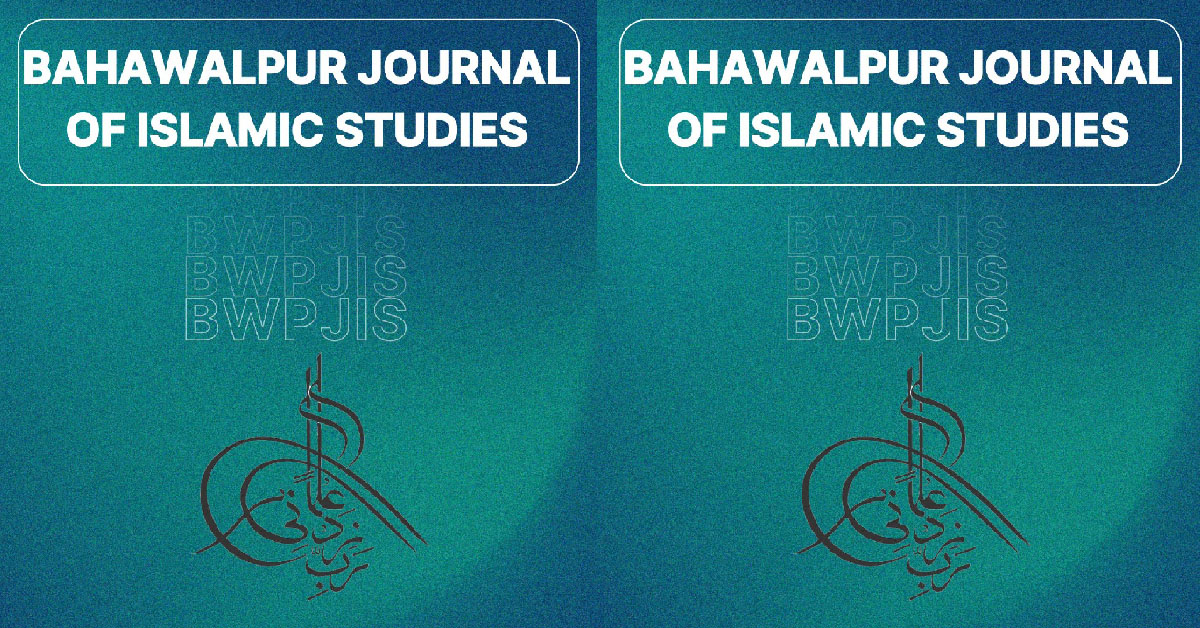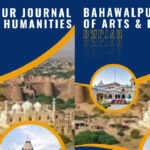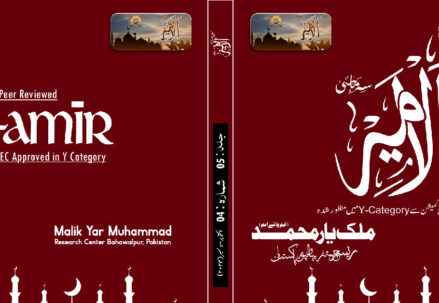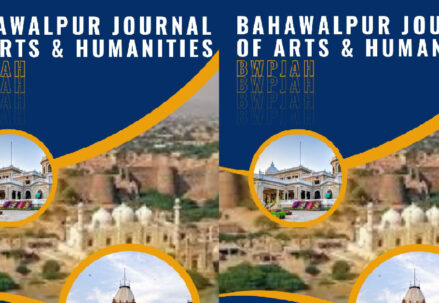The Bahawalpur Journal of Islamic Studies is an esteemed academic publication dedicated to the advancement of scholarly research in the field of Islamic studies. Published by the Malik Yar Muhammad (MYM) Research Center, the journal aims to provide a platform for the presentation and dissemination of original research that explores the rich intellectual and spiritual traditions of Islam. It seeks to bridge the gap between classical Islamic scholarship and contemporary issues, offering insightful perspectives that address the challenges faced by Muslim societies in the modern world.
About the Journal
The Bahawalpur Journal of Islamic Studies serves as a distinguished forum for research on various aspects of Islam, including theology, jurisprudence, history, culture, philosophy, and contemporary issues. The journal welcomes contributions that examine Islamic teachings, historical developments, and the socio-political impact of Islam on global societies. It also provides an interdisciplinary platform where scholars from diverse fields can engage with the intellectual heritage of Islam and its application in contemporary contexts.
The journal’s content is intended to promote critical thought and scholarly inquiry within the Muslim world and beyond, encouraging dialogue between Islamic tradition and modern academic disciplines. Its commitment to quality research and academic rigor makes it a leading publication for those engaged in the study of Islam and its role in the modern world.
Scope of the Journal
The Bahawalpur Journal of Islamic Studies covers a wide range of topics that contribute to the understanding of Islamic thought, culture, and practices. Its areas of focus include, but are not limited to:
- Islamic Theology and Beliefs: The journal delves into Islamic theology (Aqidah), exploring topics such as the Oneness of God (Tawhid), Prophethood, and the Day of Judgment. It also addresses contemporary debates and discussions within Islamic belief systems, contributing to a deeper understanding of the faith.
- Islamic Jurisprudence (Fiqh): Articles related to Islamic law (Sharia), its sources, and its application in modern societies are a central feature of the journal. This includes research on classical fiqh, ijtihad (independent legal reasoning), and contemporary challenges in Islamic legal systems.
- Islamic History: The journal offers research on the historical development of Islam, including the life of the Prophet Muhammad (PBUH), the early Islamic period, the rise and fall of Islamic empires, and the role of Islam in shaping the modern world. It also examines the history of Islamic scholarship and its influence on global intellectual movements.
- Islamic Philosophy: The journal includes articles that explore the philosophical dimensions of Islam, such as Islamic metaphysics, ethics, and epistemology. It engages with the thoughts of classical Muslim philosophers like Al-Farabi, Avicenna, and Al-Ghazali, as well as contemporary Islamic philosophers.
- Islam and Contemporary Issues: This section focuses on the application of Islamic principles to modern-day challenges, including topics such as politics, economics, social justice, gender equality, human rights, and the role of Islam in addressing global issues such as climate change and economic development.
- Islamic Culture and Society: The journal addresses the diverse cultural practices of Muslim communities around the world, exploring the intersection of Islam with local customs, art, architecture, literature, and social norms. It also examines the role of Islamic teachings in shaping societal values and practices.
Aim and Objectives
The Bahawalpur Journal of Islamic Studies aims to:
- Advance Islamic Scholarship: To promote high-quality research and scholarly contributions that further the understanding of Islamic teachings, history, culture, and contemporary issues.
- Foster Interdisciplinary Dialogue: To encourage research that bridges the gap between Islamic studies and other academic disciplines, fostering an interdisciplinary approach to addressing modern-day challenges.
- Promote Critical Thought: To provide a platform for critical, constructive, and reflective thought on Islamic issues, encouraging scholars to engage with both classical Islamic scholarship and contemporary thought.
- Support Emerging Scholars: To offer emerging scholars an opportunity to present their research and gain exposure to the broader academic community, thus supporting their academic and professional growth.
- Contribute to Global Islamic Discourse: To promote dialogue between Islamic scholars from diverse traditions and regions, facilitating global discussions on the role of Islam in the modern world.
- Peer-Review and Publication Process
- All submissions to the Bahawalpur Journal of Islamic Studies undergo a rigorous peer-review process to ensure academic quality and integrity. The journal follows a double-blind review system, where both the identities of the authors and reviewers are concealed to maintain objectivity and fairness. Each submission is evaluated by experts in the respective field, ensuring that only the highest-quality research is published.
Ethical Standards
The Bahawalpur Journal of Islamic Studies adheres to the highest ethical standards in the publication process. The journal upholds the principles of academic integrity and transparency, and it expects authors to follow these guidelines:
- Originality: All submitted works must be original and not published elsewhere.
- Plagiarism: Any form of plagiarism is strictly prohibited.
- Proper Citation: Authors must properly cite sources and give credit to previous research and intellectual contributions.
- Conflict of Interest: Authors must disclose any potential conflicts of interest that may influence their work.
Editorial Board
The editorial board of the Bahawalpur Journal of Islamic Studies consists of renowned scholars and experts in Islamic studies from both national and international institutions. Their extensive knowledge and expertise ensure that the journal maintains the highest standards of scholarship and academic rigor.
Impact and Recognition
The Bahawalpur Journal of Islamic Studies is widely recognized as a leading academic journal in the field of Islamic studies. It is indexed in several prestigious academic databases and is recognized by universities, research institutions, and scholars globally. The journal’s impact extends beyond academia, influencing discussions in policy, governance, and social issues related to the Muslim world.
The Bahawalpur Journal of Islamic Studies serves as an essential academic platform for researchers and scholars in the field of Islamic studies. By publishing original, high-quality research, it contributes to the ongoing development of Islamic scholarship and the advancement of knowledge in key areas such as theology, jurisprudence, history, philosophy, and contemporary social issues. Through its commitment to academic excellence, the journal plays a crucial role in fostering intellectual growth and promoting global dialogue on the role of Islam in the modern world.





